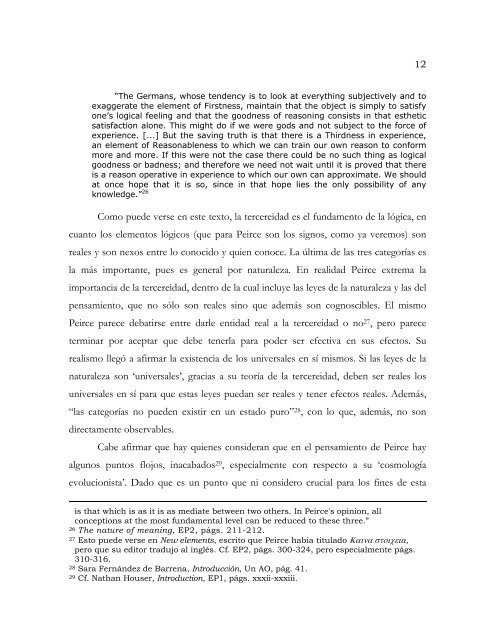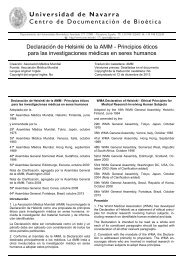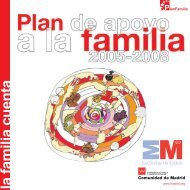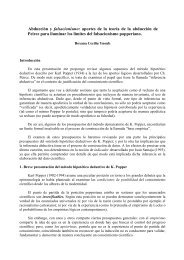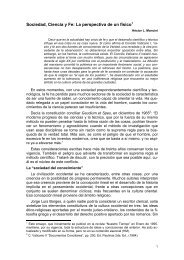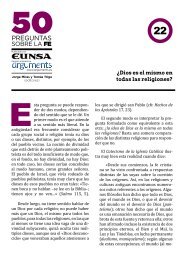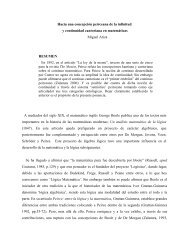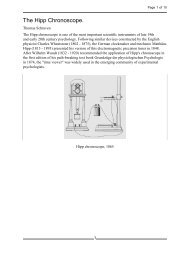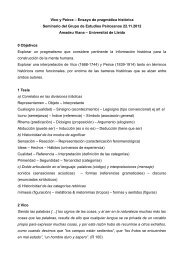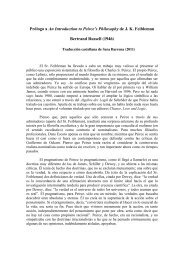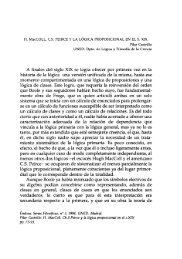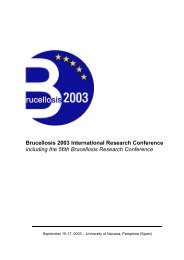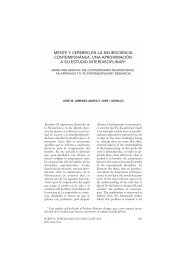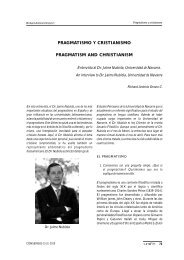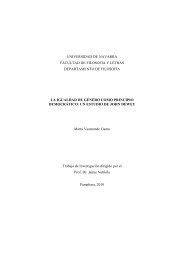Aportes filosóficos de Charles Sanders Peirce - Universidad de ...
Aportes filosóficos de Charles Sanders Peirce - Universidad de ...
Aportes filosóficos de Charles Sanders Peirce - Universidad de ...
You also want an ePaper? Increase the reach of your titles
YUMPU automatically turns print PDFs into web optimized ePapers that Google loves.
12<br />
“The Germans, whose ten<strong>de</strong>ncy is to look at everything subjectively and to<br />
exaggerate the element of Firstness, maintain that the object is simply to satisfy<br />
one’s logical feeling and that the goodness of reasoning consists in that esthetic<br />
satisfaction alone. This might do if we were gods and not subject to the force of<br />
experience. [...] But the saving truth is that there is a Thirdness in experience,<br />
an element of Reasonableness to which we can train our own reason to conform<br />
more and more. If this were not the case there could be no such thing as logical<br />
goodness or badness; and therefore we need not wait until it is proved that there<br />
is a reason operative in experience to which our own can approximate. We should<br />
at once hope that it is so, since in that hope lies the only possibility of any<br />
knowledge.” 26<br />
Como pue<strong>de</strong> verse en este texto, la tercereidad es el fundamento <strong>de</strong> la lógica, en<br />
cuanto los elementos lógicos (que para <strong>Peirce</strong> son los signos, como ya veremos) son<br />
reales y son nexos entre lo conocido y quien conoce. La última <strong>de</strong> las tres categorías es<br />
la más importante, pues es general por naturaleza. En realidad <strong>Peirce</strong> extrema la<br />
importancia <strong>de</strong> la tercereidad, <strong>de</strong>ntro <strong>de</strong> la cual incluye las leyes <strong>de</strong> la naturaleza y las <strong>de</strong>l<br />
pensamiento, que no sólo son reales sino que a<strong>de</strong>más son cognoscibles. El mismo<br />
<strong>Peirce</strong> parece <strong>de</strong>batirse entre darle entidad real a la tercereidad o no 27 , pero parece<br />
terminar por aceptar que <strong>de</strong>be tenerla para po<strong>de</strong>r ser efectiva en sus efectos. Su<br />
realismo llegó a afirmar la existencia <strong>de</strong> los universales en sí mismos. Si las leyes <strong>de</strong> la<br />
naturaleza son ‘universales’, gracias a su teoría <strong>de</strong> la tercereidad, <strong>de</strong>ben ser reales los<br />
universales en sí para que estas leyes puedan ser reales y tener efectos reales. A<strong>de</strong>más,<br />
“las categorías no pue<strong>de</strong>n existir en un estado puro” 28 , con lo que, a<strong>de</strong>más, no son<br />
directamente observables.<br />
Cabe afirmar que hay quienes consi<strong>de</strong>ran que en el pensamiento <strong>de</strong> <strong>Peirce</strong> hay<br />
algunos puntos flojos, inacabados 29 , especialmente con respecto a su ‘cosmología<br />
evolucionista’. Dado que es un punto que ni consi<strong>de</strong>ro crucial para los fines <strong>de</strong> esta<br />
is that which is as it is as mediate between two others. In <strong>Peirce</strong>'s opinion, all<br />
conceptions at the most fundamental level can be reduced to these three.”<br />
26 The nature of meaning, EP2, págs. 211-212.<br />
27 Esto pue<strong>de</strong> verse en New elements, escrito que <strong>Peirce</strong> había titulado Καινα στοιχεια,<br />
pero que su editor tradujo al inglés. Cf. EP2, págs. 300-324, pero especialmente págs.<br />
310-316.<br />
28 Sara Fernán<strong>de</strong>z <strong>de</strong> Barrena, Introducción, Un AO, pág. 41.<br />
29 Cf. Nathan Houser, Introduction, EP1, págs. xxxii-xxxiii.


